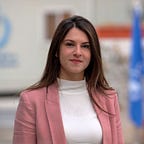‘The most difficult part of my job is not being able to help everyone’
A World Food Programme staffer in Jordan’s Zaatari refugee camp says he loves to witness the results of efforts to change lives
Naser Bardaghawi, from Irbid city— north of Jordan — has been working with the World Food Programme (WFP) for nine years.
He joined in 2012, when the Syrian crisis began and refugees from Syria crossed into the northern Jordanian border. Naser was working on the ground as a field monitor, as part of WFP’s emergency response, distributing hot meals to refugees arriving at the border.
Naser recalls the image of people walking towards the berm looking for safety. “It was a difficult time,” he says. “People were exhausted and had nothing but the clothes they were wearing.”
To this day, Naser remembers the confused looks on children’s faces, the tired elderly men and women, and the worried mothers and fathers walking towards the berm not knowing what lies ahead.
The young humanitarian aid worker felt proud being on the ground helping people, giving them a hot meal, and assuring them that they were now safe.
Watching Zaatari camp evolve
Naser also witnessed the setting up of Zaatari camp in 2013, when it became the second-largest refugee camp in the world, hosting more than 200,000 Syrian refugees.
Now, Zaatari is home to around 77,000 Syrian refugees.
“I saw how our assistance evolved from distributing hot meals, food packages, vouchers, to the innovative blockchain technology where people buy food in the blink of an eye,” says Naser.
WFP provides refugees living in camps with food assistance through cash transfers on a monthly basis. Being a Field Associate, part of Naser’s job is to ensure that WFP’s contracted supermarkets and bread shops provide people with fresh items and at the best standards.
The bakery in Zaatari produces around 43 tons of bread every day; this includes the bread for Azraq refugee camp too, which is delivered from Zaatari on a daily basis.
“Making sure the bakery is operating every day is crucial, otherwise 118,000 Syrian refugees living in both camps will not have bread on their dinner tables,” says Naser.
A trusted face in the camp
“I remember Najah, a disabled woman who arrived at the border on her neighbour’s back,” says Naser. He had carried her through the whole trip, from their home in Syria to Jordan’s border. He still visits her from time to time.
“I love my job,” says Naser. “Refugees trust me. I am one of the first faces they see when they arrive in Jordan, they are like family to me. They know we are here to help. It’s a responsibility and I feel that is my job to make them feel safe and able to access the things they need, especially food.”
Coronavirus pandemic: Living in Zaatari for two months
Naser stayed in the camp for two months due to movement restrictions across Jordan. He was the only WFP staffer on the ground in Zaatari working to ensure refugees can access their food assistance.
“I could not stay away. Zaatari is my second home, so I was happy to sleep there ensuring people had access to the services they need, especially at such critical times,” says Naser.
“It was a priority for me to make sure people have access to food. It’s not just a job to me, it’s a way of life,” says Naser, who’s worked day and night with authorities to ensure supermarkets and bakeries can operate during the lockdowns so people can have access to food.
Naser takes pride in his job and the support he gives to refugees. “The most difficult part of my job is not being able to help everyone. Nevertheless, waking up every day and making a change in people’s lives is something that puts a smile on my face.”
WFP is a lifeline for around half a million refugees in Jordan, the majority of them from Syria while the rest are from Iraq, Somalia, Sudan and Yemen.
